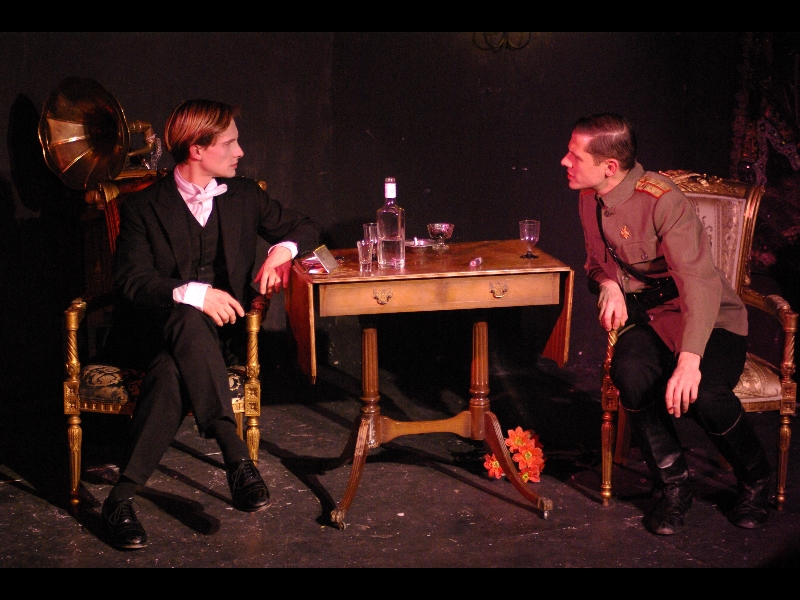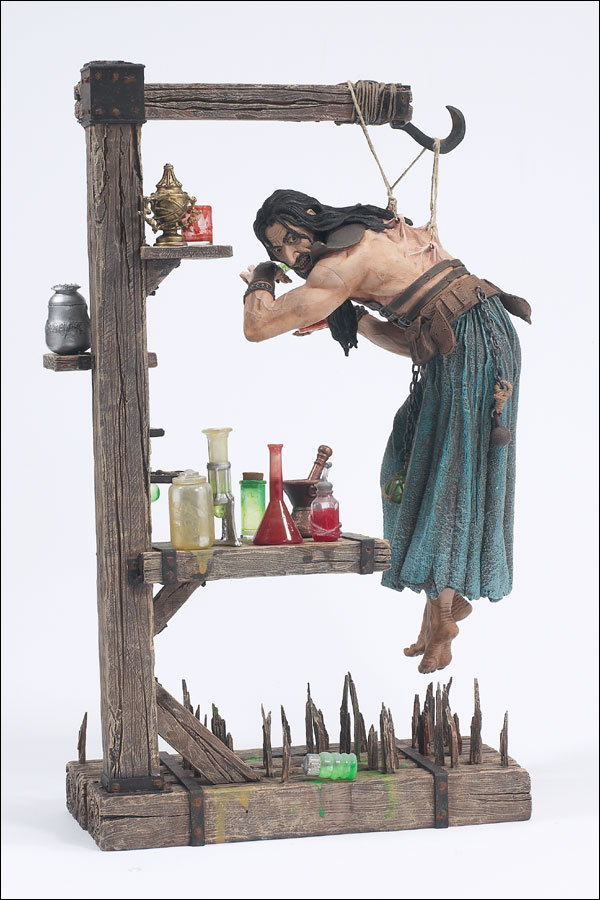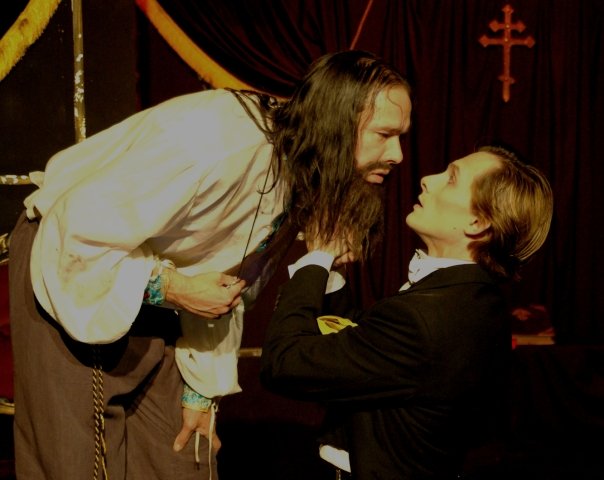Marjorie Perloff has described how “Wittgenstein’s language games have provided models for poetic composition,” and concluded that, for him “the ‘ordinary’ . . . turns out to be, after all, capable of being seen as the ‘aesthetic'” With regard to Russian history, as told by Russians, telling stories is really a separate language game; but one in which the idea of a shared logical form of both language and reality is not recognizable. There are many aspects of the famous story of Rasputin’s death that are still wrapped in profound mystery.
Wittgenstein developed ideas on the use of language outside of ”language games”, as a particular literary gesture, with a recognizable role in literary and aesthetic theory. Rasputin had the aesthetic of a swinger, living to the hilt of his celebrity status, power and influence, yet at the same time, was a religious figure whose beliefs were considered to be logically incoherent with his lifestyle, yet at the same time operated as irrefutable statements of faith on the way he and his believers endeavored to live meaningfully in the world. It was an aesthetic of attitude toward the world, and the life to be expected in it, that defied any empirical standards.
The life of Rasputin was hardly ordinary, and had as part of the aesthetic, elements that seemed to hold on for dear life to Wittgenstein’s idea of the sublime.This aids in chronicling the moral contortions of himself as a holy man and his entourage that they hazarded when the well runs expediently dry. Rasputin’s life was a sort of comedic burlesque that both participated in, and lampooned political ambition, monetary greed, rivalry, marital bliss, and political correctedness.

Rasputin ate no sweets, meat or fowl, and did not smoke. But a tremendous capacity for drink, women and song.
Rasputin was nominally of the Russian Orthodox faith, though one who seemed to pull his central themes and its execution from the same meta-philosophical pool that animated gifted rakes such as Giacomo Casanova; a variant on a form of charlatanism that seems to predominate during periods of major social change. Rasputin’s unconventional doctrines leaned on implied Messianic attributes stemming from his reputation as a ”starets”, a psychic faith healer, and the controversial concept of ”purification through transgression” which mated religious mysticism to the ambiguous relation of orthodox religious practice and sexuality.The ”mad monk” as he was known, may have been involved with the ”khlysty” an illegal religious sect in Russia that featured orgiastic rituals. The orgies and spouse trading rituals associated with Rasputin owed some indebtedness to the eighteenth century work of Jacob Frank and the Sabbateans in Eastern Europe and the Donmah cult in Greece.

RASPUTIN, A play by William Whitehurst My roles: Prince Felix Yussupov, Lead Choreographer: Benny Maslov Director: Andy McQuade Where: Rosemary Branch Theatre, Islington
Interestingly, Colin Wilson has pointed out, with plausible evidence, that the assassination of Archduke Ferdinand of Austria and the attempted assassination of Rasputin by stabbing, occured at exactly the same time.”The man whose death caused the First World War, and the man who could have averted the war, were struck down at the same moment. The coincidence is as extraordinary as any I have come across.”
Meanwhile, back at the royal love nests, in St. Petersburg and Tsarskoe Selo, the seat of the imperial palace, empress Alexandra and Rasputin were, as the expression goes, having a ball. Both of them had encouraged Nicholas to go to the front, overpowering the eloquent protests of his ministers, and the shape of things to come was suggested by a fond exchange of notes between Alexandra and her spouse shortly after the event.she wrote: ” Do not fear for what remains behind…Lovy I am here,don’t laugh at silly old wifey, but she has ‘trousers’ on unseen…It is all much deeper than appears to the eye….God is with you and our Friend for you- all is well”.

- ”A powerful new play from the unequivocally adventurous Second Skin Theatre and penned by resident writer William Whitehurst brings the story of Rasputin –that mythical mad monk who helped destroy an empire – and his era to the stage in a stunning new production at the Rosemary Branch Theatre in Islington.”
What followed was a governmental debacle. Rasputin by this time was under intense fire from both left and right in the Duma; the only way he could protect his privileged position was to get rid of ministers who were opposed to him and install those who had good reason to be friendly; either because they had bribed him, or because he had something on them from his unusual sources of information. it was not a procurement system likely to bring good men to office, and in any case, Rasputin’s crystal ball fogged badly when it came to picking ministers, however innocuous his intentions may have been.
It must be remembered that Rasputin was almost entirely uneducated. For all his native insight he knew almost next to nothing about the monstrous problems of economics and administration that the war’s devastation had brought to Russia. As for Alexandra, she seemed to blindly accept any recomendation that her man of God made to her, passing the word along to Nicholas in letters, that as the months went
escalated from hints to wheedling and from wheedling to outright hysterical insistence.
- Rasputin. The Opera:”Compared to his previous opera, the intimate and musically more original Aleksis Kivi , Rautavaara’s new opus seems like a step back in time — to be more specific, into the first half of the 19th century, the prime of Meyerbeer and Halévy. Though the story focuses on Rasputin and the Empress Alexandra, Rautavaara uses no fewer than 25 soloists. In its scale, structure and lush, even sumptuous musical texture, Rasputin is very much a grand opéra.”
The chaotic results were epitomized by three of the ministers of the interior in charge of the secret police who held office during the time. A.N. Hvostov, a prize plum of Alexandra’s turned out to have sinister underworld connections and ended by plotting unsuccessfully to kill Rasputin. He was followed by B.V. Sturmer, a double dealing reactionary who was universally despised; and his place was finally taken by A.D. Protopopov, who was so fumbling that many thought he was on the edge of insanity. Most of the lesser ministers were no better, and Russia plunged toward the abyss of revolution at an accelerating pace as the already large discontented segment of the public expanded to include many thousands of the upper classes in addition to the workers and peasants.
The revolution cannot be blamed on Rasputin, though it has been imputed that he was a tool for the Illuminati to bring down the house of Romanov. However, it is conceivable that Russia might have muddled through to the end of the war if Nicholas had remained in charge of the government and allowed himself to be persuaded towards basic social reforms leading towards a constitutional form of democracy. Certainly, the country was ready. During the first year of the war, there was a competent cabinet in Russia and the czar was a malleable fellow, especially when he was bored, and he was enormously bored by the war. The czar himself may have been playing a role, perhaps double crossed and killed, but still consciously sabotaging his reign. We may never know the truth. Rasputin may have been a facilitator, and when his role was accomplished he was no longer needed, tolerated or desired.
Rasputin was murdered, in a fashion and for reasons never entirely satisfactorily explained, in Prince Philip Yusupov’s palace in St. Petersburg on the night of December 29, 1916. Why would Rasputin have agreed to go out at midnight, without a bodyguard, when he was well aware that many people were anxious to see him dead?. Rasputin, unquestionably did have visions and could make prophecies, which was part of the mysterious dark strength he possessed. Among the visions that that mysterious seer was visited by, must be included the threatening specter of future regicide, the death of the tsar’s son, and of course his own inescapable death as well as the equally sorry fate of those connected to him.
The assassins melodramatic tale about how the starets was lured to a strange basement apartment, poisoned without effect, shot, came back to life, struggled, broke through a locked door, shot again, then pitched from a bridge through the ice of the Neva River where police found it shortly with water in the lungs. Call it the dubious devil fable of Russian folk legend for; the killers were rather obscure and shadycharacters and the story, like a Dostoevsky novel, has many twists hiding in urns, and a large cast of accomplices. One researcher has indicated connections between Trotsky and Lenin with freemasonry as well as Marx and Engels lodge ties; which possibly adds context to the unfolding drama of the Revolution, and a desire to foment instability.
”… in the last December of the Romanov Empire, a corpse bobbed to the surface of the Malaya Nevka River in Petrograd. Ice-encrusted with a mutilated face. But the most startling thing was its hands. It bound hands were raised. For there, under the icy water, that extraordinary individual, although beaten and shot, had still been alive, and had still been trying to break free of his fetters. And, as the police would later write in their report, great numbers of people hurried down to the river with flasks, jugs, and buckets to ladle up the water in which the awful body had just been floating. They wanted to scoop up with the water the deceased’s diabolical; improbable strength, of which all Russia had heard. (The Rasputin File by Edvard Radzinsky )

Prince Yusupov , the ringleader was a transvestite who drew attention from army officers and V.M. Purishkevich was a far right member of the Duma, known for his passionate hatred of liberals, radicals and Jews; one of the organizers of a group of reactionaries known as ”the Black Hundreds” who worked with the secret police in promoting anti-Jewish riots. He once appeared at the Duma wearing a red carnation on the fly of his trousers.
Though miserably botched, the crime was in a sense a perfect one. The murderers were never prosecuted since one of them was a member of the royal family. The mismatched troika that had been running and ruining the nation was suddenly minus its leader, and no lightning came from heaven to avenge him. It likely occurred to many that perhaps getting rid of the other two might not be so difficult. The bread riots of 1917 exploded into irrepressible revolution and by then the Czars abdication and promise to establish democratic legislative institutions was too late. Nicholas’s own doubts about whether the revolution could have been avoided still invites a definitive answer.

” on top of the absurdities in the standard account, the principal assassin, Prince Yusupov, has muddled his story on two crucial points: how rasputin was lured to the Yusupov palace on the night of Dec. 29, 1916, and what the motive was for killing him. In 1934, the producers of a movie that depicted a sexual connection between Rasputin and Yusupov’s young wife, Princess Irina, lost a libel suit to her. Yet, in Yusupov’s suit against CBS in 1965, for invasion of privacy, it was demonstrated that the prince’s own earlier account had hinted that at least Irina’s name had been used as bait for Rasputin. As for the murder motive, during the trial of that 1965 suit Yusupov said that the motive was not, as he had always maintained before, the patriotic intention to rid Russia of an evil force, but simply to destroy Rasputin because of his ‘sexual depravity’ ” ( E.M. Halliday )
”A later vignette finds Yusupov at 12 in a restaurant dressed as a woman, drunk on champagne, flinging pearls at nearby diners. Being found out by his parents as a café singer in drag a few years later didn’t stop his further dress-up escapades, such as attending a St Petersburg opera ball as Richelieu in a flowing cape, “its train carried by two little Negroes”, or the Bal des Quat’z Arts in Paris, dressed in one of Nijinksy’s stage costumes (lent to him by Diaghilev).”










 COMMENTS
COMMENTS